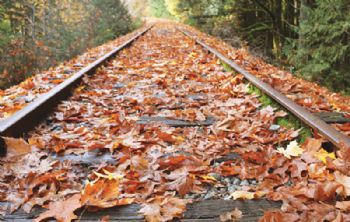
Network Rail says it will be travelling the equivalent of more than four times around the world on the south-western rail network to combat leaves on the line, which act like black ice on roads and can cause train delays throughout the autumn months.
This particular network has more than 1,300 miles of track, much of which is surrounded by trees and other vegetation, which must be regularly treated to keep tracks clear.
Six specially designed trains with high-pressure water jets are expected to cover around 120,000 miles in the coming months on the route.
Leaves cause problems on the rail network when they stick to damp rails and trains compress them into a smooth, slippery layer that reduces wheel grip and requires the drivers to brake earlier when approaching stations and signals — and to accelerate more gently to avoid wheel spin.
Taking these factors into account, South Western Railway has published an autumn timetable that took effect on 7 October and will run until 8 December.
Becky Lumlock, route managing director for Network Rail, said: “The issue of leaves on the line is a very real problem for the railway industry, and it will present us with a number of challenges in the coming months.
“Our teams of engineers will be working round-the-clock to keep the tracks clear and keep people on the move.
"We will also be monitoring leaf-fall very closely, in order to tackle high-risk areas before they become a problem for trains.
"Leaves can also interfere with the signalling system, by interrupting the connection between the wheel and the track, reducing its ability to detect a train’s location.”
Equipped with a high-pressure pump, leaf-busting trains clean the rails by spraying them with a water jet at very high pressure (1,500 bar) to blast away leaf mulch.
They then apply a layer of ‘adhesion modifier’ to the rail to aid traction.
Throughout the autumn season, a high-definition adhesion forecasting service will be provided by the Met Office to forecast rail adhesion based on station-to-station sections.
This will help to shape a number of ‘operational mitigations’, including extra treatment and notifications to signallers and train crew.
Details of how Network Rail is tackling this leaf problem can be found at the Web site (
www.networkrail.co.uk/autumn).